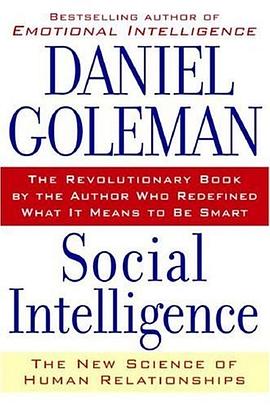

具体描述
Emotional Intelligence was an international phenomenon, appearing on the New York Times bestseller list for over a year and selling more than five million copies worldwide. Now, once again, Daniel Goleman has written a groundbreaking synthesis of the latest findings in biology and brain science, revealing that we are “wired to connect” and the surprisingly deep impact of our relationships on every aspect of our lives.
Far more than we are consciously aware, our daily encounters with parents, spouses, bosses, and even strangers shape our brains and affect cells throughout our bodies—down to the level of our genes—for good or ill. In Social Intelligence, Daniel Goleman explores an emerging new science with startling implications for our interpersonal world. Its most fundamental discovery: we are designed for sociability, constantly engaged in a “neural ballet” that connects us brain to brain with those around us.
Our reactions to others, and theirs to us, have a far-reaching biological impact, sending out cascades of hormones that regulate everything from our hearts to our immune systems, making good relationships act like vitamins—and bad relationships like poisons. We can “catch” other people’s emotions the way we catch a cold, and the consequences of isolation or relentless social stress can be life-shortening. Goleman explains the surprising accuracy of first impressions, the basis of charisma and emotional power, the complexity of sexual attraction, and how we detect lies. He describes the “dark side” of social intelligence, from narcissism to Machiavellianism and psychopathy. He also reveals our astonishing capacity for “mindsight,” as well as the tragedy of those, like autistic children, whose mindsight is impaired.
Is there a way to raise our children to be happy? What is the basis of a nourishing marriage? How can business leaders and teachers inspire the best in those they lead and teach? How can groups divided by prejudice and hatred come to live together in peace?
The answers to these questions may not be as elusive as we once thought. And Goleman delivers his most heartening news with powerful conviction: we humans have a built-in bias toward empathy, cooperation, and altruism–provided we develop the social intelligence to nurture these capacities in ourselves and others.
From the Trade Paperback edition.
作者简介
目录信息
读后感
看这本书的同时,正好手边还有另外一本书,台湾作家张德芳的《遇见未知的自己》,这个巧合,却带来了太多非巧合的联系。 初次拿起《社交商》这本书的时候,草草看了一眼简介,以为大致是一本风靡全球的流行心理学或者社会学读物。当时心想,文笔应该很通俗很时髦,会带来很多阅...
评分看这本书的同时,正好手边还有另外一本书,台湾作家张德芳的《遇见未知的自己》,这个巧合,却带来了太多非巧合的联系。 初次拿起《社交商》这本书的时候,草草看了一眼简介,以为大致是一本风靡全球的流行心理学或者社会学读物。当时心想,文笔应该很通俗很时髦,会带来很多阅...
评分学院派的作者写得还是比较学究的,各种实验,各种神经回路等等。但正如作者说的那样,就算你对社交的各因素可以分析得分条缕析,也不能让你成为社交高手。 就比如说我非常清楚地认识到自己为何不被某些群体接纳,这种认知也不能帮我融入那群体,尽管我有那意愿...
评分读这个书名的时候,你可能觉的这里面会介绍一些和人相处的技巧,甚至是什么手段之类的东西。 其实,看过才知道,是一本关于心理学方面的著作。整个文本的理论依据,据作者讲是现代的神经科学的新发现。 感觉还是一本心理学方面的书籍,对现实的指导意义并非迅速,但很深刻。会...
评分看这本书的同时,正好手边还有另外一本书,台湾作家张德芳的《遇见未知的自己》,这个巧合,却带来了太多非巧合的联系。 初次拿起《社交商》这本书的时候,草草看了一眼简介,以为大致是一本风靡全球的流行心理学或者社会学读物。当时心想,文笔应该很通俗很时髦,会带来很多阅...
用户评价
讲太多科学了,枯燥
评分not a bad book
评分太理论化, 没耐性看完...
评分not a bad book
评分Fun facts again. Nothing earth shattering. And the attitude. People should do this. People would do that. Statistics. No analysis
相关图书
本站所有内容均为互联网搜索引擎提供的公开搜索信息,本站不存储任何数据与内容,任何内容与数据均与本站无关,如有需要请联系相关搜索引擎包括但不限于百度,google,bing,sogou 等
© 2025 book.quotespace.org All Rights Reserved. 小美书屋 版权所有




















